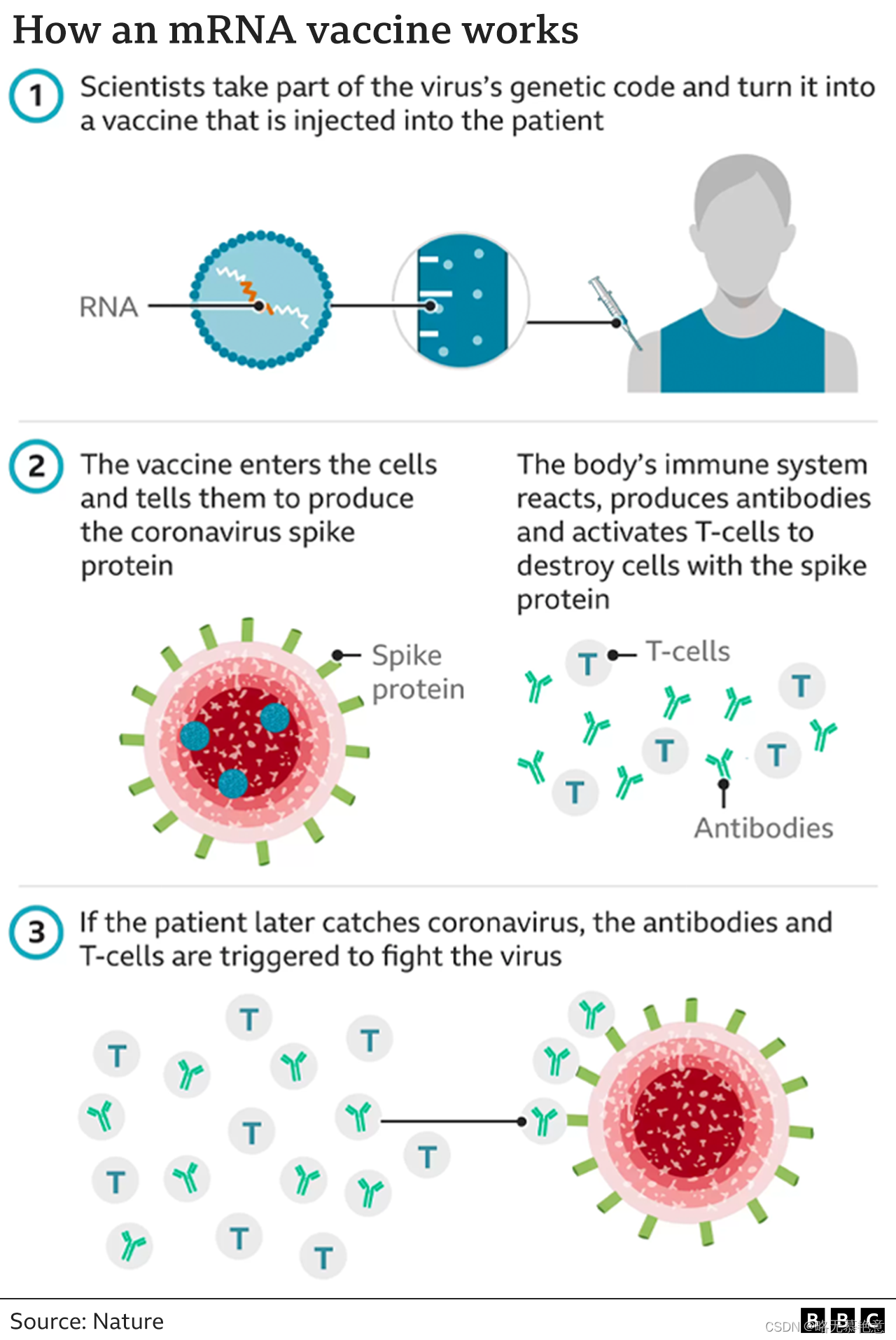Nobel Prize goes to scientists behind mRNA Covid vaccines
By James Gallagher
Health and science correspondent
‾
\overline{\quad\quad\ \ }
The Nobel Prize in Physiology or Medicine has been awarded to a pair of scientists who developed the technology that led to the mRNA Covid vaccines.
- the Nobel Prize in Physiology or Medicine:诺贝尔生理学或医学奖
- physiology
/fɪziˈɒlədʒi/: n . n. n. 生理学- physiologist: n . n. n. 生理学家
- physiological: a d j . adj. adj. 生理学的;生理上的
- physiologically: a d v . adv. adv.从生理学角度
- be awarded to:某人被授予某个奖项、荣誉或奖励
- a pair of:一对,一双,一副
- lead to:导致,引起,致使
- vaccine
/vækˈsiːn/: n . n. n. 疫苗 a d j . adj. adj. 牛痘的,预防疫苗的,种痘的- vaccinate
/ˈvæksɪˌneɪt/: v . v. v. 进行预防接种 n . n. n. 被接种牛痘者 - vaccination: n . n. n. 接种疫苗,种痘,牛痘疤
- vaccinate
诺贝尔生理学或医学奖被授予两位开发了针对新冠感染的有效信使核酸(mRNA)疫苗技术的科学家
Professors Katalin Kariko and Drew Weissman will share the prize.
- share:
v
.
v.
v. 合用,分配,均分,分享,分担
n
.
n.
n. 一份,份额;股票,股份
- share sth. with:与……分享……
- share and share alike:平分(均分),均摊;有福同享
- go shares: v . v. v. 分享,分担,合伙经营
- share option:股票期权
卡塔琳 · 考里科和德鲁 · 韦斯曼教授共同荣获此奖项
The technology was experimental before the pandemic, but has now been given to millions of people around the world to protect them against serious Covid-19.
- experimental:
a
d
j
.
adj.
adj. 实验的,实验的;科学实验的
- experimentally: a d v . adv. adv. 实验上地;用实验方法
- experiment:
v
.
v.
v. 进行实验,尝试
n
.
n.
n. 实验,尝试
- experiment on/with:试用;用……做实验
- experiment in:进行(某课题)的实验,做……实验
- millions of:成百上千万,数以百万计
- protect ··· ··· against ··· ···:保护……不受……的损害或侵犯
- protect后接from和against的区别:两者意思相近,但较大的事件若天灾多用against,小事件如冷气则用from
在疫情爆发之前,这项技术仍处于实验阶段。但是现如今这项技术已经被提供给全世界数百万人,以保护他们免遭严重的新冠病毒感染
The same mRNA technology is now being researched for other diseases, including cancer.
- research:
n
.
n.
n.
~(into/on sth./sb.)研究;调查;探索 v . v. v.~(into/on sth./sb.)研究;探讨;调查- do/ carry out、conduct/ undertake research into/ on sb./ sth.:对……进行调查/ 研究
- medical/ historical/ scientific, etc. research:医学、历史、科学等研究
- research project/ grant/ student:研究项目/ 经费;研究生
- research a problem/ topic/ market:研究一个问题/ 课题/ 市场
目前,这项信使核酸(mRNA)技术正在被用于研究其他疾病,包括癌症。
The Nobel Prize committee said: “The laureates contributed to the unprecedented rate of vaccine development during one of the greatest threats to human health in modern times.”
-
committee: n . n. n. 委员会
-
laureate: n . n. n. 荣誉获奖者;获奖者;桂冠诗人(Poet Laureate的简称)
-
contribute: v . v. v.
~(sth.)(to/towards sth.)捐赠,捐献(尤指款或物);捐助
~(to sth.)是……的原因之一
~(sth.) to sth.增加;增进;添加(到某物);促成某事,导致某事
~(sth.) (to sth.)(为报纸、杂志、电台或电视节目)撰稿;在(会议或会谈期间)讲话,(尤指)发表意见-
contribution: v . v. v. 捐款,捐资 (给雇主或政府用作医疗保险、养老金等津贴的)定期缴款 贡献;促成作用
(书、杂志、广播、讨论等部分内容的)一则、一条、稿件 捐赠;捐助;(尤指)捐款
- make a contribution/ contributions to sth.:为某事做贡献
-
contributor: n . n. n. (杂志或书的)撰稿人,投稿人;(电台、电视节目中的)嘉宾;(会议的)发言人
捐款者;捐赠者;作出贡献者 促成物
-
-
one of + adj.最高级 + 可数名词复数:最……之一
-
unprecedented:前所未有的;空前的;没有先例的
-
threat: n . n. n. 恐吓,威胁;凶兆,征兆
- be/ pose a threat to sth.:对……造成威胁
- under threat:受到威胁
诺贝尔奖委员会表示:“在现代人类健康面临最大威胁之一的时期,两位获奖者为疫苗开发达到前所未有的速度做出了卓越贡献。”
Both were told they had won by telephone this morning and were said to be “overwhelmed” .
-
overwhelmed: a d j . adj. adj. 被压倒的,被淹没的;受宠若惊的;不知所措的
overwhelmed by grief overwhelmed with sorrow } 悲痛欲绝 \begin{rcases} \textbf{overwhelmed by grief} \\ \\ \textbf{overwhelmed with sorrow} \end{rcases} \text{悲痛欲绝} overwhelmed by griefoverwhelmed with sorrow⎭ ⎬ ⎫悲痛欲绝
-
overwhelm: v . v. v. (感情或感觉)充溢,难以禁受 压倒;击败;征服 压垮;使应接不暇 淹过;漫过
今天早上,两人都通过电话得知自己被授予诺贝尔生理学或医学奖,都表示“(对获奖)不知所措”。
Vaccines train the immune system to recognize and fight threats such as viruses or bacteria.
-
immune system:免疫系统
-
virus: n . n. n. 病毒
-
bacteria
/bækˈtɪəriə/:细菌- bacterium
/bækˈtɪəriəm/:细菌
- bacterium
疫苗训练免疫系统识别和对抗病毒或细菌等威胁。
Traditional vaccine technology has been based on dead or weakened versions of the original virus or bacterium - or by using fragments of the infectious agent.
-
fragment: n . n. n. 碎片;片段 v . v. v. (使)破裂,破裂,分裂
-
infectious: a d j . adj. adj. 传染性的,感染性的(尤指通过呼吸) 患有传染病的,有传染力 有感染力的,有影响力的
-
agent: n . n. n. (企业、政治等的)代理人,经纪人 (演员、音乐家、运动员、作家等的)代理人、经纪人
原动力、动因(指对事态起重要作用的人、事物) (化学)药剂 施事者;施动者;行为主体
-
infectious agent:传染性病原体
传统的疫苗技术基于原始病毒或者病菌的死亡或弱化版本,或者使用传染原的片段。
In contrast, messenger ribonucleic acid (mRNA) vaccines use a completely differently approach.
-
In contrast:相反地,相比之下
-
messenger ribonucleic acid:信使核糖核酸
-
approach: v . v. v. (在距离或时间上)靠近,接近
~ sb (about/for sth.) | ~ sb (about doing sth.)接洽;建议;要求 (在数额、水平或质量上)接近 着手处理;对付
n . n. n.
~ (to sth.)(待人接物或思考问题的)方式、方法、态度 (距离和时间上的)靠近、接近 接洽;建议;要求 通路;路径;道路 进场;进场着陆 相似(或近似)的事物
相比之下,信使核糖核酸 (mRNA) 疫苗则采用完全不同的方法。
During the Covid pandemic, the Moderna and Pfizer/BioNTech vaccines were both based on mRNA technology.
Professor Kariko and Professor Weissman met in the early 1990s when they were working at the University of Pennsylvania, in the United States, when their interest in mRNA was seen as a scientific backwater.

新冠病毒大流行期间,Moderna 和 Pfizer/BioNTech 疫苗均基于 mRNA 技术。
Kariko 教授和 Weissman 教授于 20 世纪 90 年代初相识,当时他们在美国宾夕法尼亚大学工作,当时他们对 mRNA 的兴趣被视为科学停滞。
An mRNA Covid vaccine contains the genetic instructions for building one component - a protein - from the coronavirus.
mRNA 新冠疫苗包含从冠状病毒中构建一种成分(蛋白质)的遗传指令。
When this is injected into the body, our cells start producing lots of the viral protein.
The immune system recognizes these as foreign so it attacks and has learned how to fight the virus, and therefore has a head start when future infections occur.
The big idea behind the technology is that you can rapidly develop a vaccine against almost anything - as long as you know the right genetic instructions to use.
This makes it far faster and more flexible than traditional approaches to vaccine development.
There are even experimental approaches using the technology that are teaching patients’ bodies how to fight their own cancers.
Scientists analyze a patient’s tumour, look for abnormal proteins being produced by the cancer that are not in healthy tissue and develop a vaccine to target those and inject that into the patient.
Profs Kariko and Weissman made the crucial breakthroughs that made mRNA vaccines happen.
The principle taps into normal human biology. RNA’s role in our body is to convert the instructions that are locked away in our genetic code, or DNA, into the proteins that our body is built from.

However, there were challenges. But by refining the technology, the researchers were able to produce large amounts of the intended protein without causing dangerous levels of inflammation that had been seen in animal experiments.
This paved the way for developing the vaccine technology for use in people.
Katalin Kariko is now a professor at Szeged University in Hungary and Drew Weissman is still working as a professor at the University of Pennsylvania.
当它被注射到体内时,我们的细胞开始产生大量的病毒蛋白。
免疫系统将这些病毒识别为外来物质,因此它会发起攻击并学会如何对抗病毒,因此在未来发生感染时能够抢占先机。
该技术背后的重要理念是,只要您知道正确的基因指令,您就可以快速开发出针对几乎任何事物的疫苗。
这使得它比传统的疫苗开发方法更快、更灵活。
甚至有一些实验方法使用该技术来教导患者的身体如何对抗自己的癌症。
科学家分析患者的肿瘤,寻找健康组织中不存在的癌症产生的异常蛋白质,并开发一种针对这些蛋白质的疫苗并将其注射到患者体内。
Kariko 和 Weissman 教授取得了关键突破,使 mRNA 疫苗成为现实。
该原理利用了正常的人类生物学。 RNA 在我们身体中的作用是将遗传密码或 DNA 中锁定的指令转化为构成我们身体的蛋白质。
然而,也存在挑战。 但通过改进技术,研究人员能够生产大量目标蛋白质,而不会引起动物实验中出现的危险水平的炎症。
这为开发用于人类的疫苗技术铺平了道路。
卡塔琳·卡里科 (Katalin Kariko) 现为匈牙利塞格德大学教授,德鲁·韦斯曼 (Drew Weissman) 仍担任宾夕法尼亚大学教授。
